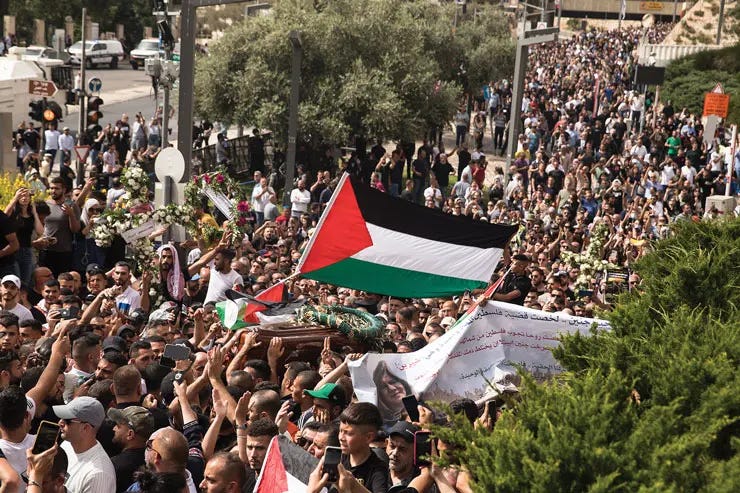The Israeli war on Palestinian nationalism continues
Israel denial of Arab Ministers visit to Ramallah as an example
When the foreign ministers of Turkiye, Saudi Arabia, Jordan, Egypt, and the United Arab Emirates planned a visit to Ramallah last weekend, it wasn’t for a symbolic photo-op in Al-Manara Square. It was a rare and deliberate show of solidarity—an affirmation of Palestinian nationalism at a time when it is under open attack.
As momentum builds for the June 17–20 Saudi-French initiative on the two-state solution in New York, Israel is doubling down on a less-publicized but far-reaching campaign: the delegitimization of Palestinian national identity and governance.
The current assault on Hamas in Gaza is only one front in this campaign. At its core lies a deeper strategy to deny Palestinians their inalienable right to self-determination by dismantling the institutions that give that right expression.
The Arab and Muslim ministers’ attempt to visit Ramallah was not about propping up a widely criticized Palestinian president. Rather, it was a clear endorsement of the Palestinian political framework—imperfect and constrained though it is—at a time when Israel is trying to erase it.
President Mahmoud Abbas has undertaken modest reforms, including painful concessions to Israel, such as halting stipends to families of prisoners and martyrs. These steps have earned him little in return. Israel continues to withhold more than 7 billion shekels (roughly $2 billion) in Palestinian tax revenues, in violation of its own legal commitments under the Oslo framework. Meanwhile, Palestinian public servants are scraping by on partial salaries.
Even more damaging than the economic strangulation is the political message Israel is sending. Its rejection of the Ramallah visit was relayed through none other than Hussein Al-Sheikh, Abbas’s vice president and chief liaison with Israel—someone long committed to security coordination with the occupation. Israel is happy to accept that coordination, but refuses to acknowledge or strengthen the Palestinian Authority in return.
This is not cooperation. It’s a one-way street.
Israel's daily military operations in West Bank refugee camps—Jenin, Tulkarem, Nablus—are designed to fragment and intimidate, not to stabilize. Its refusal to allow Arab ministers to land in Ramallah, even by Jordanian military helicopter, is an unprecedented move. It was a calculated snub, not only of Palestinians, but also of countries that have diplomatic relations—and in some cases, peace treaties—with Israel.
For these governments, the incident was more than a logistical denial. It was a public insult. These are the very regimes that normalized ties with Israel in the hope of moderating its behavior. Instead, they were told—bluntly—that even symbolic gestures of support for Palestine will not be tolerated.
The response can’t be a Zoom call. If Arab and Muslim leaders mean what they say about supporting Palestine, this moment demands real political and economic backing. It’s time to stop funding the occupation with silence.
And Palestinians, too, have a role to play. Abbas must go beyond minimum reforms and lead a national effort to rebuild and reunite the Palestinian political house. That means reviving the Palestine Liberation Organization and opening its doors to all political factions, including those in the diaspora. It means preparing for inclusive leadership and real elections, not symbolic reshuffles.
Most urgently, it means shifting from fragmented armed struggle to a unified strategy of political and popular resistance.
By the end of 2024, the State of Palestine had been recognized by 146 countries, with more preparing to follow. That momentum must be seized. Palestinian nationalism is not a relic of the past—it is the beating heart of a people determined to live with dignity, free from occupation, settlements, and colonial domination.
The blocked visit to Ramallah is not a minor diplomatic scuffle. It is a sign of how far Israel is willing to go to erase even the symbols of Palestinian sovereignty. It must not be forgotten.
Not by Ramallah. Not by Riyadh. And certainly not by the rest of us.




